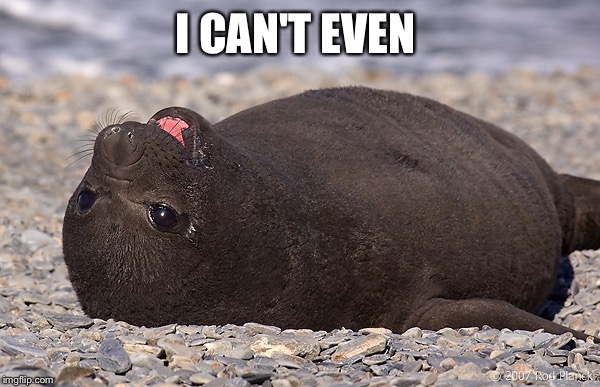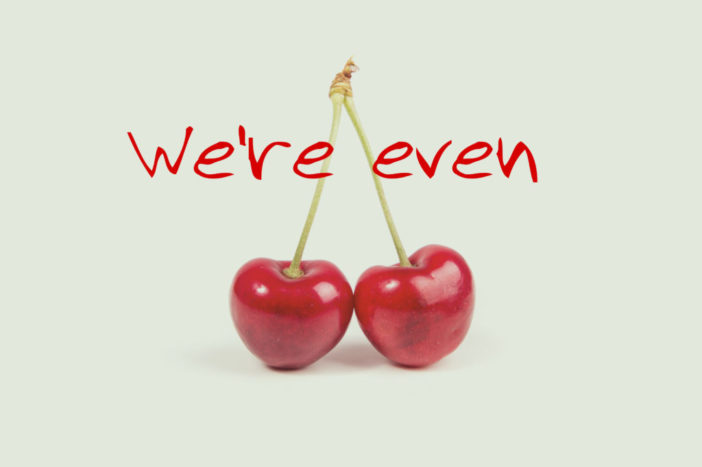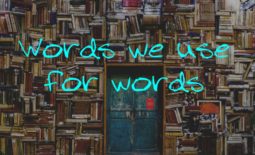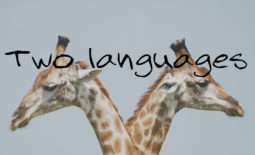We’re even
Even … a four-letter English word with a ton of uses and meanings.
My student Ray asked me a few days ago if there was any difference between although and even though. And that made me think about all the ways we use this little word.
♥ ♥ ♥ ♥
First, even can be used as an adjective (or as an adverb with –ly) to mean flat, smooth, or level.
The highway workers are filling in holes to make the road more even.
She spoke evenly and calmly, without raising her voice.
An even-tempered person won’t get annoyed or angry easily.
Or even can mean equal or balanced.
The tennis players are an even match; I don’t know who will win.
The mother divided the cake evenly among her five children.
Another common use of even is divisible by two; the opposite of odd.
Even numbers are two, four, six, eight, and so on.
♥ ♥ ♥ ♥
We often use the phrasal verbs even out and even up.
Even out usually means to make something level or fair.
The workers evened out the road surface by filling in the holes and smoothing out the bumps.
My co-worker and I took turns answering the office phone. Sometimes he had to talk to difficult clients, and sometimes I did, but in the end, it evened out.
Even up is often used when something or someone reaches the same level as something or someone else.
Our basketball team was behind, but at halftime, the score had evened up.
♥ ♥ ♥ ♥
Even can be used to emphasize how strange or unusual something is.
Some Americans don’t even know how many states are in the U.S.
You can find McDonald’s even in remote parts of the world.
Even the best students sometimes fail a test.
Or even can be used as an intensifier for comparatives.
He is even stupider than I thought.
She was even more beautiful than he had imagined.
♥ ♥ ♥ ♥
How about even though and even if, which are both subordinating conjunctions?
Even though can be used in the place of although, but there is a subtle difference in meaning. Even though means despite or in spite of.
Even though it’s raining, I’m still planning to go to the park.
Despite (or in spite of) the rain, I’m still planning to go to the park.
Although is used more in “on the one hand, on the other hand” situations.
Although the text states that dinosaurs might have lived in Antarctica, the professor disagrees.
Even if means no matter whether or not something happens.
Even if it rains, I’m going to go to the park.
Notice that even though is used in a situation that is already happening (it’s raining right now), while even if is used for a possible future event (it may or may not rain in the future).
Beware!
I often hear TOEFL test-takers use even by itself when they should use even though or even if. For example:
Even the man studies tonight, he still might fail the test. (It should be even if the man studies …)
Even the woman wants to see her family, I think she should stay in her dorm and study. (It should be even though the woman wants …)
♥ ♥ ♥ ♥
Finally, some other common uses of even.
Even so, by itself, is a short way of saying “Even if this is so (i.e., true)”; it has the same meaning as nevertheless.
Speaker One: It’s raining right now!
Speaker Two: Even so, I’m going to take a walk.
Even now emphasizes that something is the same as it was before (maybe in surprising way).
Even now, after all these years, I think back on my grandmother’s death and feel sad.
To get even means to get revenge.
After he left his girlfriend, she was determined to get even.
To break even means that the profits of a company equal its costs.
Holiday sales helped the store to break even, despite the decrease in customers earlier that year.
A common idiomatic expression is to be even. This means that your situations are now the same, implying that there might have been a difference before.
You got an A in chemistry, and I got an A in calculus, so I guess we’re even.
He paid for the gas, and she paid for the parking, so they’re even.
Finally, there is a very trendy expression, I can’t even.
This means that something is so funny, or cute, or scary, or remarkable in some way, that there’s nothing you can say. This is an expression that’s particularly popular and common on social media.





